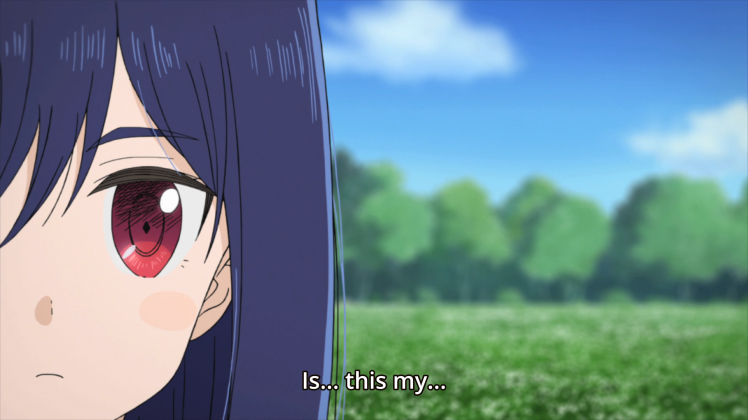Let’s start by getting one thing out of the way: I really like the concept of recursion (and fractals, but that’s beside the point). This factors into my interpretation of events for Flip Flappers’s 11th episode.
After getting my daily dose of Flip Flapping today and properly digesting some of the ideas and visuals presented, I went browsing what other people had to say. There are bound to be quite a number of blog posts currently springing up focused on both the series as a whole and the specific episodes as they air, and in this case I quite enjoyed going through this one about the lessons one could take from episode 6 with Iroha going into #11. It’s a very interesting take on the story and I encourage everyone to check it out. Putting that aside, reading about that perspective made me realize I had my own version and possible explanations for the kind of phenomenon taking place with Mimi and Pure Illusion (PI henceforth).
While during this episode it’s plain to see that both Mimi and Papika had prior experiences with entering the gates to the psyche and minds of people by way of PI (as was the case with Salt’s father), and must have experienced what it was like to alter someone’s personality and/or memories therein, that might’ve not necessarily meant that Mimi was prepared to deal with the consequences of entering her own PI. For in the scene that begins with the walled white room and ends with the grassy plains surrounding the lake and Mimi seemingly ceding control to another side of herself, there’s a moment where she apparently believes she’s inside her own version of PI, much like Uexkull, Iroha, Bu-chan and Salt’s father had their own (not just the inner gates).
Now, if we recall many of the earlier episodes, just being inside a certain PI made it so Cocona was rather quickly influenced into behaving in slightly different ways. Nibbling things in episode 2, fighting Papika in episode 3, and so on. Would it be that much of a stretch to assume that Mimi would likewise be the same? Even if not for any PI associated with someone or something else, then perhaps just with her own very special version. As she stepped foot into what one would presume to be her safe space inside her mind, the notion that she was secure and safe made her prone to choose an approach and reasoning that emphasized protection, containment and security above all else. The moment that she entered into her own PI might’ve spelled the fact that she would choose to relegate her decisions to a more extreme version of herself, bent on safeguarding her daughter at all costs. Essentially, that entrance into her mindscape/PI initiated a positive feedback cycle, an outgrowing recursive event that changed her inside and outside.
Even the conversation she holds with an aspect of herself could be seen as the dialogue between her original personality, and one that represented her subconscious doped with the repeated positive reinforcement originating from her PI, telling her how to go about ensuring the right future for her and Cocona. By making a decision then and there, she might have done more than just change her approach. By virtue or acting inside her PI, she might’ve enacted a change in her complete personality, overwriting and modifying parts of herself to match that image provided by her subconscious. Much like Cocona and Papika changed Iroha in more ways than one when they interfered in her PI.
I acknowledge that the reasoning I presented here is much less satisfying as a lens with which to view the earlier episodes’ themes on Cocona’s development and subconscious desires. It also seemingly removes a lot of agency from Mimi’s actions. The nature of PI as a place that fragments people’s personality into several entities fits nicely with how episodes 6, 7 and 11 were told, whereas this concept of cyclical convergence upon entering one’s own PI is short-lived in usefulness. And yet, I can’t say no to an explanation that relies heavily on the idea of recursion, heh.



One thought on “Recursive decision-making and Flip Flapping”